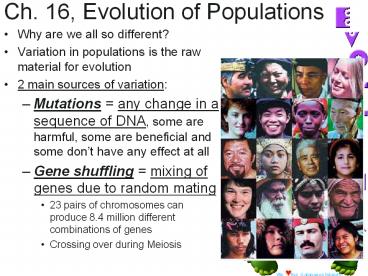Ch. 16, Evolution of Populations - PowerPoint PPT Presentation
1 / 4
Title:
Ch. 16, Evolution of Populations
Description:
Why are we all so different? Variation in populations is the raw material for evolution 2 main sources of variation: Mutations = any change in a – PowerPoint PPT presentation
Number of Views:26
Avg rating:3.0/5.0
Title: Ch. 16, Evolution of Populations
1
Ch. 16, Evolution of Populations
- Why are we all so different?
- Variation in populations is the raw material for
evolution - 2 main sources of variation
- Mutations any change in a sequence of DNA,
some are harmful, some are beneficial and some
dont have any effect at all - Gene shuffling mixing of genes due to random
mating - 23 pairs of chromosomes can produce 8.4 million
different combinations of genes - Crossing over during Meiosis
2
Variation and Gene Pools
- Genetic variation is studied in POPULATIONS, not
individuals - Members of a population share a Gene Pool
- Gene pool consists of all genes, including all
the different alleles that are present in a
population - Why?
- They descended from a common ancestor
- Relative frequency of an allele number of times
an allele occurs in a gene pool - So, evolution is any change in the relative
frequency of alleles in a population
3
- Genetic Drift random change in allele
frequencies that occurs in small populations - In small populations, individuals that carry a a
particular allele may leave more descendants than
other individuals, jus by chance. Over time, a
series of chance occurrences of this type can
cause an allele to become common in a population
4
- Genetic Equilibrium allele frequencies remain
constant - Five conditions required to maintain genetic
equilibrium - Random mating
- The population must be very large
- No movement into or out of the population
- No mutations
- No natural selection
- This is the Hardy-Weinberg principle































